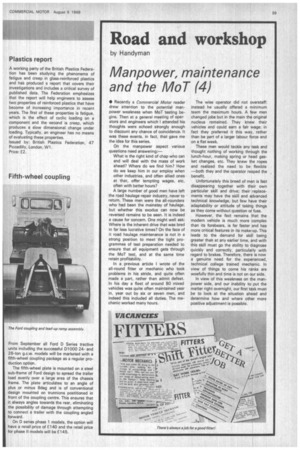Road and workshop
Page 61

If you've noticed an error in this article please click here to report it so we can fix it.
by Handyman
Manpower, maintenance and the MoT (4)
• Recently a Commercial Motor reader drew attention to the potential manpower weakness when MoT testing begins. Then at a general meeting of operators and engineers which I attended his thoughts were echoed strongly enough to discount any chance of coincidence. It was these events, in fact, that gave me the idea for this series.
On the manpower aspect various questions need answering:—
What is the right kind of chap who can and will deal with the mass of work ahead? Where do we find him? How do we keep him in our employ when other industries, and often allied ones at /hat, offer tempting wages, etc, often with better hours?
A large number of good men have left the road haulage repair industry, never to return. These men were the all-rounders who had been the mainstay of haulage, but whether this exodus can now be reversed remains to be seen. It is indeed a cause for concern. One might well ask: Where is the inherent drive that was bred in far less lucrative times? On the face of it road haulage maintenance is not in a strong position to meet the tight programmes of test preparation needed to ensure that all equipment gets through the MoT test, and at the same time retain profitability.
In a previous article I wrote of the all-round fitter or mechanic who took problems in his stride, and quite often made a part, rather than admit defeat. In his day a fleet of around 80 mixed vehicles was quite often maintained year in, year out by six or seven men, and indeed this included all duties. The mechanic worked many hours. The wise operator did not overstaff; instead he usually offered a minimum team the maximum hours. A few men changed jobs but in the main the original nucleus remained. They knew their vehicles and could earn a fair wage; in fact they preferred it this way, rather than be part of a larger labour force and on a flat week.
These men would tackle any task and thought nothing of working through the lunch-hour, making spring or head gasket changes, etc. They knew the ropes and realized the need to be flexible —both they and the operator reeped the benefit.
Unfortunately this breed of men is fast disappearing together with their own particular skill and drive; their replacements may have the skill and advanced technical knowledge, but few have their adaptability or attitude of taking things as they come without question or fuss.
However, the fact remains that the modern vehicle is much more complex than its forebears, is far faster and has more critical features in its make-imp. This leads to the demand for skill being greater than at any earlier time, and with this skill must go the ability to diagnose quickly and correctly, particularly with regard to brakes. Therefore, there is now a genuine need for the experienced, technical college trained mechanic. In view of things to come his ranks are woefully thin and time is not on our side.
In view of this weakness on the manpower side, and our inability to put the matter right overnight, our first task must be to look at the situation ahead and determine how and where other more positive adjustment is possible.
















































































































































